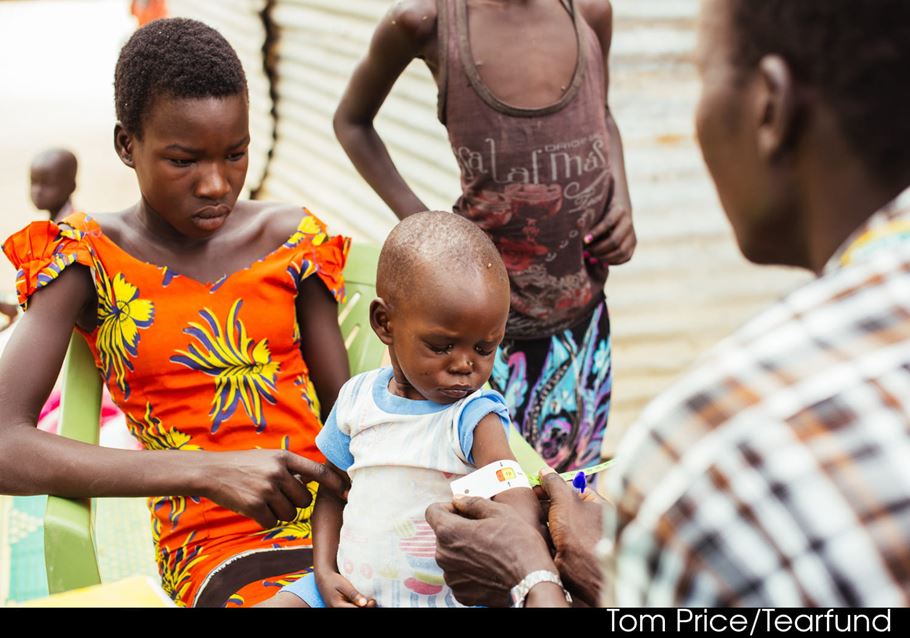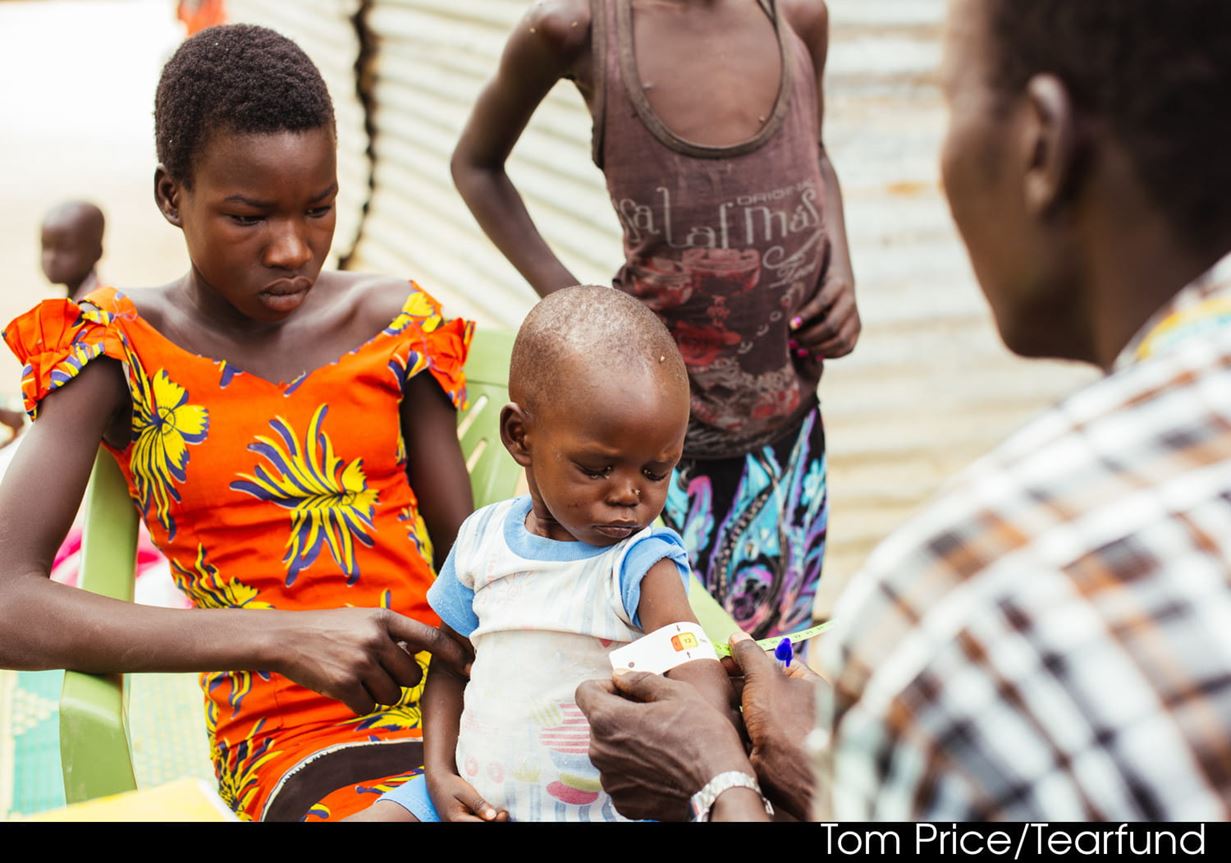- Conflict, political instability, natural disasters, poor economic conditions and now coronavirus have contributed to a complex crisis in South Sudan
- 1.3m children likely to become acutely malnourished this year
- Tearfund is launching an appeal to extend its programme of feeding stations
While the coronavirus pandemic has been the major issue in the UK and many countries worldwide in 2020, in South Sudan it is just the latest in a series of crises which have piled one on top of another, leaving 1.3m children in this new and under-resourced state likely to suffer from acute malnutrition this year. [Source: UNICEF]
Young mothers such as Alek, Martha and Grace* have first hand experience of the compound effect of multiple crises.
Civil war forced Alek from her home. The family had to make several temporary moves, during which her cattle and goats were lost, before settling in a flood-prone, mosquito-ridden area. Collecting firewood for sale brought in a tiny income but even this had to stop when one of her daughters became unwell and could no longer walk.
Martha was living with her husband and family when violence in 2013 caused them to flee their home, and in their absence it was set on fire. The disruption meant she had to spend time in a displaced persons’ camp, where her 6-month-old baby became malnourished.
Grace had no access to information about the importance of breastfeeding and lost her first child to malnutrition. When her second also became malnourished and started to suffer from severe diarrhoea, she was able to take him to one of the feeding centres run by Tearfund.
Anthony Rama, South Sudan Country Director for international development agency, Tearfund, explained the context: ‘It’s not just coronavirus - people are facing multiple challenges. Last year there was serious flooding in the areas where Tearfund works, which wiped out crops and brought water-borne diseases. We’re concerned that the next rainy season, which normally starts in August, will bring more flooding. There is ongoing intercommunal violence, despite efforts to make peace sustainable. Because peace is slow to realise, it is hard for individual households to build their own livelihoods or grow food. The restrictions around the coronavirus pandemic add to these difficulties because travel and economic and social interactions are limited. This is why it has been so hard for families to make sure their children can eat properly, and why we are seeing more children becoming malnourished.’
In South Sudan, many children go hungry and many more don’t get enough essential nutrients. Poor quality water brings recurring bouts of diarrhoea, and access to health care is made difficult by factors such as long distances, poor roads, flash flooding and now coronavirus-related travel restrictions.
The national prevalence of under-5-year-old stunting and wasting - two outcomes of child malnutrition - in South Sudan are both much higher than the average for developing countries**.
In three districts in South Sudan, Tearfund is the only agency running feeding programmes. Tearfund is launching its appeal to continue and extend this vital work and has organised mobile feeding stations which move between villages, as well as static ones in health centres. Children are screened to see which ones need to be enrolled in programmes, where they are given supplementary feeding, and their mothers are trained on how to prepare nutritious meals, how to practise good hygiene, how to spot signs of malnutrition and how to pass all this knowledge on to others.
Speaking of the appeal for funds, Anthony Rama said: ‘We know there is much more need than we are able to meet at the moment, and much more we want to do. Just training volunteers to help educate other mothers on nutrition and hygiene - this alone is hugely helpful even without the added benefit of supplementary feeding. Getting volunteers out into the community makes a significant difference.’
Grace, Martha and Alek, like millions of other mothers in South Sudan, are battling mighty problems, of which coronavirus is just the latest, but they are not without hope. While at Tearfund’s feeding centre Grace joined a support group for mothers and soon became the group leader, training to become a counsellor, providing daily support to mothers in need, and training others in turn. She also leads activities that help the centre engage with the local community and is looked upon as a role model. Her own baby is now a picture of chubby health, and the Tearfund support groups have helped more than 2,000 women. Martha returned home with her child, who was successfully treated in Tearfund’s feeding centre but she still lives in fear of cattle raiders taking her precious assets. Alek, whose daughter is now able to walk and play with her siblings, is hopeful about the future of her children. Before the coronavirus lockdown they were going to school, and she is cultivating a kitchen garden to keep them well fed.
‘Lasting peace has eluded this country so far,’ said Anthony Rama, ‘which means many hardworking South Sudanese people don’t yet have the capability to settle down to their livelihoods. We are praying for peace, but until that day arrives we will keep doing all we can to help people sustain a good life.’
To support Tearfund’s work in South Sudan, please visit www.tearfund.org/martha
For further information or interview requests with Anthony Rama, please call Louise Thomas, media officer, on 07590 775847. For out of hours media enquiries please call 07929 339813
Photos Filename: RS95238 - a two-year-old child is assessed for malnutrition at a Tearfund feeding station in Twic East, South Sudan. Credit Tom Price/Tearfund Filename: Alek with child - for mothers like Alek [pictured] access to Tearfund feeding stations can be a vital lifeline when raising a child in South Sudan. Credit: Tearfund
Notes to editors: *names changed to protect identity ** The national prevalence of under-five-year-olds with stunting in South Sudan is 31.3%, which is greater than the developing country average of 25%. South Sudan's under-five wasting prevalence of 24.3% is also greater than the developing country average of 8.9%. Source: Global Nutrition Report 2020 which defines stunting/stunted as children who do not have enough nourishment to grow properly. [Stunting is defined as length or height-for-age z-score more than 2 standard deviations below the median of the World Health Organisation Child Growth Standards.] Children who are too thin because of undernutrition are ‘wasted’. [Wasting is defined as weight-for-length or height z-score more than 2 standard deviations below the median of the WHO Child Growth Standards.] It is becoming increasingly clear that children who are wasted are more likely to become stunted and vice versa.
Malnutrition - definition: People are malnourished if their diet does not provide adequate calories and protein for growth and maintenance or they are unable to fully utilize the food they eat due to illness (undernutrition). They are also malnourished if they consume too many calories (overnutrition). [Source UNICEF ]
South Sudan: South Sudan gained independence from Sudan in 2011. Made up of the 10 southern-most states of Sudan, South Sudan is one of the most diverse countries in Africa. It is home to over 60 different major ethnic groups, and the majority of its people follow traditional religions. Independence did not bring conflict in South Sudan to an end. Civil war broke out in 2013 leading to a conflict that has displaced some 4 million people. [Source BBC ] The BBC’s Coronavirus in Africa Tracker gives the latest figures on the disease in South Sudan.
Tearfund’s Appeal for South Sudan: A donation of £40 will train five parents in nutrition and in how to protect their children from malnutrition. £70 will enable a group of mothers like Grace to train fellow mothers and caregivers for a month on feeding and caring for infants, which helps prevent the spread of diseases and infections. £119 will help ensure a feeding centre runs safely during the pandemic by providing staff with a month’s worth of protective equipment. Tearfund is a Christian relief and development agency and a member of the Disasters’ Emergency Committee.
Tearfund has been working around the world for more than 50 years responding to disasters and helping lift communities out of poverty. For more information about the work of Tearfund, please visit www.tearfund.org.









![for mothers like Alek [pictured] access to Tearfund feeding stations can be a vital lifeline when raising a child in South Sudan.](/-/media/random/2020/06/24/15/41/alek-with-child-(1).jpg?mw=910)
![for mothers like Alek [pictured] access to Tearfund feeding stations can be a vital lifeline when raising a child in South Sudan.](/-/media/random/2020/06/24/15/41/alek-with-child-(1).jpg?mw=1231)

